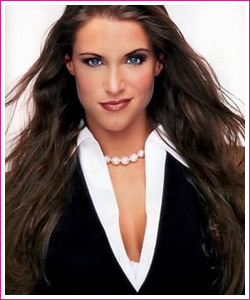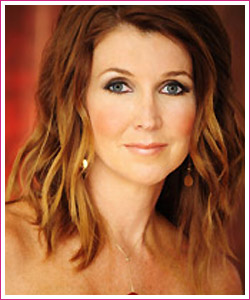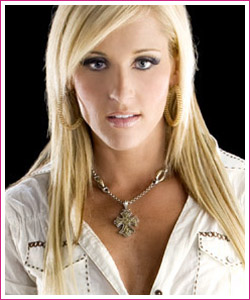
In the Saturday Supplement, the Diva Dirt team will aim to discuss a news story, a televised event or other relevant and current topics. The objective, like the average weekend newspaper, is to offer more indepth and lengthy discussion.
With TNA President, Dixie Carter set to make her first official on-screen appearance for TNA this coming Thursday, this week we are looking at what it means to be a woman in power in the wrestling industry in relation to promoting women’s wrestling.
 It is assumed that any women in professional wrestling with a position of power would want to advocate their women. Surely they would want to create a strong, empowered representation of their Divas, Knockouts et al for the audience? Given hindsight, it can be argued that isn’t the case. In fact, looking at the McMahon family and the two women in prominent roles, Linda and Stephanie McMahon, what have either of these women really done for the Divas in WWE?
It is assumed that any women in professional wrestling with a position of power would want to advocate their women. Surely they would want to create a strong, empowered representation of their Divas, Knockouts et al for the audience? Given hindsight, it can be argued that isn’t the case. In fact, looking at the McMahon family and the two women in prominent roles, Linda and Stephanie McMahon, what have either of these women really done for the Divas in WWE?
It is almost shocking that in the time that Stephanie McMahon has been in power as head of WWE’s Creative Team, that the women’s division has been on a decline. The emphasis on sex appeal rather than brain & braun can date back to the early soap opera-esque feuds on SmackDown in 2002, including a lesbian angle with Dawn Marie and Torrie Wilson. Publicly, McMahon has been acknowledged as somewhat of an advocate, including by the aforementioned Dawn Marie. In a shoot interview also featuring Torrie Wilson, Dawn said something along the lines of how Stephanie worked with the girls in order to be portrayed as having brains and not just being sold as a sex object on television.
However, looking at the television output — there has been countless situations in which under McMahon’s governing, the women of the company were perceived as just that, sex objects. The Diva Search in 2004 particularly changed the way the WWE Divas brand was run and the way that the women’s division would be considered. The after effects of which are still felt to this day. However in today’s WWE, there seems to be a bigger emphasis on wrestling due to the PG rating, yet the Divas segments continue to be an afterthought and unregarded by the writing staff which McMahon heads. It is true that the senior McMahon, Vince, is ultimately the one that signs off on most of the television but given their personal dynamic, would it not be easy for Stephanie to stand her ground if she were truly an advocate of the women in the company?
Women in business tend to get a bad wrap; they are branded as ‘ball busters’ or ‘bitches’. Psychologists suggest that to survive in a business environment, women have to desensitize their femininity and behave more masculine. In professional wrestling – or sports entertainment as WWE calls it – there is no denying the industry is a man’s world. And while the female McMahons may have positions of power, one could argue that they too, act like males in order to survive and achieve longevity in the wrestling business.
The negative stereotypes of women in business can’t be unfounded, right? Most stereotypes have some semblance of truth hidden away in there somewhere. For argument’s sake, perhaps Stephanie McMahon is the competetitive, threatening female businesswoman that stereotypes will have you believe. Women in business, supposedly, are more competetitive with each other than with men. Could McMahon’s separation of investment in the female talent be because of this? Does she fear coming across ‘weak’ if she is seen striving for a part of the product that is ‘inferior’? Continuing the hypothetical trend, could Stephanie also feel threatened somewhat by women in the industry as she feels she is on a higher plateau?
It was reported that McMahon was behind the release of former ECW Diva, Ariel – real name Shelly Martinez. Among the reasons speculated, one was that she felt Martinez didn’t fit the ‘WWE Diva look’. Fans often fall into the line of thinking that in a man’s sport, men dictate what is the ‘look’ for the women in this industry. This piece of news suggests that a female herself conforms to this stereotypical ‘WWE Diva look’ and as a result, looks down on women who don’t fit that mould. Does this add credence that women in business try to hold back other women?
 On the other side of the spectrum is TNA’s Dixie Carter. From the beginning stages of the Knockouts division, officially launched in October 2007, Carter has come across as a true advocate of women getting ahead and to an extent, the opposite of the McMahon females. She has often boasted her respect for the women in her company, even appearing on camera on last year’s ‘Knocked Out’ DVD.
On the other side of the spectrum is TNA’s Dixie Carter. From the beginning stages of the Knockouts division, officially launched in October 2007, Carter has come across as a true advocate of women getting ahead and to an extent, the opposite of the McMahon females. She has often boasted her respect for the women in her company, even appearing on camera on last year’s ‘Knocked Out’ DVD.
Carter’s progressive Knockouts division has capitalised and strengthened in areas that WWE views as inferior. Among the Knockouts’ assets are the promotion of different body types, different looks for the girls and a non-comformist attitude. In other aspects of the division; women are promoted more equally to the men — though not entirely as such, however. The boundary-pushing women’s wrestling on TNA television allows the Knockouts to be received on the same level as the men’s matches, for example. Compared to WWE, who we ourselves have confirmed from multiple sources, doesn’t allow the women to wrestle in a style that may ‘outshine the men’ or a style that could be comparable to the men, Carter’s Knockouts are a refreshing alternative. TNA have also made headway in merchandising such as DVDs and t-shirts; two prominent features of the WWE Divas brand of yore that have been as overlooked as the product in recent years.
However Carter too, is not without her criticisms. Her recent statement of women being ‘properly represented’ was shot to pieces last Sunday on pay per view. The ordeal surrounding Cody Deaner’s involvement in the Knockouts division and the Knockouts Championship it was deemed, was a WWE-esque tactic that we would not expect of TNA. The further humiliation of the Beautiful People at the hands of Deaner harkened to WWE’s oft misogynistic writing which at one point had Trish Stratus barking like a dog. This from TNA and from a president who has gone on record several times in her advocation of women’s wrestling and her Knockouts division. The hypocritical actions have led to this writer being more sceptical of the Knockouts division in future and not taking things at face value. While on the surface, the product may seem more progressive than it’s rival — there are many holes that could still be poked in this division that would further call into question Carter’s advocacy of women’s wrestling.
It seems to me that the best female promoters seem to be the ones that have actually gotten in the ring themselves. Listening to SHIMMER co-founder, Allison Danger discuss her backstage duties and the level of care she seems to have towards the women who compete for SHIMMER is admirable. No doubt, her own experiences have helped forge the advocacy that seemed apparent in our own Women of Wrestling Podcast.
 And to bring things even more closer to home; Women’s Champion Michelle McCool is often slandered for her ‘political stroke’ due to her relationship with the Undertaker, though no solid suggestion has been made of her using said political stroke. Sure she may have some but does that mean she has ever wielded it? From those we have spoken to in the WWE lockerroom past and present, McCool seems to be in the same boat as all the other Divas and is subject to the same inane writing or lack of writing in most weeks that the rest receive. I ask you, if McCool were to wield the political stroke that its assumed she has, wouldn’t the women’s division be in a much better state than it currently is? Like Allison Danger, having been there and done that, wouldn’t McCool want to present women’s wrestling in WWE in a way that she could be proud of? I boldly suggest that I think the division would be better off if McCool did exercise the political stroke that seems to be the ire of Internet fans.
And to bring things even more closer to home; Women’s Champion Michelle McCool is often slandered for her ‘political stroke’ due to her relationship with the Undertaker, though no solid suggestion has been made of her using said political stroke. Sure she may have some but does that mean she has ever wielded it? From those we have spoken to in the WWE lockerroom past and present, McCool seems to be in the same boat as all the other Divas and is subject to the same inane writing or lack of writing in most weeks that the rest receive. I ask you, if McCool were to wield the political stroke that its assumed she has, wouldn’t the women’s division be in a much better state than it currently is? Like Allison Danger, having been there and done that, wouldn’t McCool want to present women’s wrestling in WWE in a way that she could be proud of? I boldly suggest that I think the division would be better off if McCool did exercise the political stroke that seems to be the ire of Internet fans.
Digging deeper, there doesn’t seem to be a ‘black and white’ mandate amongst women in power in relation to women’s wrestling; there are always shades of grey. It seems that women’s wrestling in the main promotions is only advocated when it suits the promoter.
I am not denying that it’s hard to be a woman in business because we all know the stereotypes. In the wrestling industry alone, one Lia Maivia [grandmother of The Rock] was almost demonized by some for her efforts as wrestling’s first female promoter.
Yet I can’t help but feel that the female higher-ups should be called into question more for their hand in women’s wrestling and more scrutinised by fans, female fans in particular, for the lack of advancement. As a female wrestling fan, do you not think: “Hold on a minute… You’re a woman and you’re representing women like this?”
